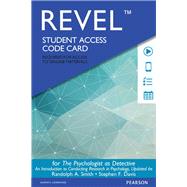
The REVEL for Psychologist as Detective An Introduction to Conducting Research in Psychology -- Access Card
by Smith, Randolph A.; Davis, Stephen FRent Textbook
Buy Courseware
New Textbook
We're Sorry
Sold Out
Used Textbook
We're Sorry
Sold Out
How Marketplace Works:
- This item is offered by an independent seller and not shipped from our warehouse
- Item details like edition and cover design may differ from our description; see seller's comments before ordering.
- Sellers much confirm and ship within two business days; otherwise, the order will be cancelled and refunded.
- Marketplace purchases cannot be returned to eCampus.com. Contact the seller directly for inquiries; if no response within two days, contact customer service.
- Additional shipping costs apply to Marketplace purchases. Review shipping costs at checkout.
Summary
REVEL is Pearson’s newest way of delivering our respected content. Fully digital and highly engaging, REVEL offers an immersive learning experience designed for the way today's students read, think, and learn. Enlivening course content with media interactives and assessments, REVEL empowers educators to increase engagement with the course, and to better connect with students.
NOTE: REVEL is a fully digital delivery of Pearson content. This ISBN is for the standalone REVEL access card. In addition to this access card, you will need a course invite link, provided by your instructor, to register for and use REVEL.
Author Biography
Randolph A. (Randy) Smith is Professor and Chair of Psychology at Lamar University. Randy completed his undergraduate degree at the University of Houston and PhD at Texas Tech University in experimental psychology (specialties in human learning/memory and statistics). Randy taught at Ouachita Baptist University in Arkansas for 26 years, chaired Kennesaw State University’s Psychology Department for four years, and became Chair of Lamar University’s Psychology Department in 2007. His professional work centers on the scholarship of teaching and learning. Randy served for 12 years as Editor of the Society for the Teaching of Psychology’s journal Teaching of Psychology and subsequently served as Editor of the Psi Chi Journal of Undergraduate Research.
He has written several book chapters and articles and made numerous presentations dealing with varied aspects of teaching, applying social psychology to teaching, and assessment of teaching. He has worked with high school teachers grading AP exams since the test’s inception and has served as Faculty Advisor for TOPSS (Teachers of Psychology in Secondary Schools). He is a member of the American Psychological Association (a Fellow of Divisions 1 and 2–General Psychology and Teaching) and a Fellow of the Association for Psychological Science. In 2006, Randy received the American Psychological Foundation’s Charles L. Brewer Distinguished Teaching of Psychology Award and the University System of Georgia Regents’ Scholarship of Teaching and Learning Award.
Stephen F. Davis is Roe R. Cross Distinguished Professor Emeritus of Psychology at Emporia State University in Emporia, Kansas. Currently he is Visiting Distinguished Professor of Psychology at Texas Wesleyan University and Distinguished Guest Professor at Morningside College. In 2002—2003 he was the Knapp Distinguished Professor of Arts and Sciences at the University of San Diego. He received his bachelor’s and master’s degrees in psychology from Southern Methodist University and his PhD in experimental psychology from Texas Christian University. In 2007 he was awarded the honorary Doctor of Humane Letters degree by Morningside College. His research, which always includes student assistants, has investigated such diverse topics as academic dishonesty, learning versus grade orientation of students, Type A personality, the Impostor Phenomenon, and the behavioral effects of ingesting toxic metals. He is the author of more than 300 journal articles, 31 books, and more than 900 convention presentations.
Steve’s teaching abilities have drawn acclaim on the national level. He has received the National Distinguished Teaching of Psychology Award from the American Psychological Foundation and the Teaching Excellence Award from Division Two (Society for the Teaching of Psychology) of the American Psychological Association. His professional accomplishments also include serving as president of the Southwestern Psychological Association, the Southern Society for Philosophy and Psychology, and Division Two of the American Psychological Association. He also served as the National President of Psi Chi (The National Honor Society in Psychology). He has been elected as a Fellow of the American Psychological Association, the American Psychological Society, and the American Association of Applied and Preventive Psychology.
Table of Contents
2. Developing a Good Research Idea and Conducting an Ethical Project
3. Qualitative Research Methods
4. Nonexperimental Methods: Descriptive Methods, Correlational Studies, Ex Post Facto Studies, Survey and Questionnaires, Sampling, and Basic Research Strategies
5. Using the Scientific Method in Psychology
6. Conducting a Good Experiment I: Variables and Control
7. Conducting a Good Experiment II: Final Considerations, Unanticipated Influences, and Cross-Cultural Issues
8. Internal and External Validity
9. Using Statistics to Answer Questions
10. Designing, Conducting, Analyzing, and Interpreting Experiments with Two Groups
11. Designing, Conducting, Analyzing, and Interpreting Experiments with More than Two Groups
12. Designing, Conducting, Analyzing, and Interpreting Experiments with Multiple Independent Variables
13. Alternative Research Designs
14. Writing and Assembling an APA-Format Research Report
An electronic version of this book is available through VitalSource.
This book is viewable on PC, Mac, iPhone, iPad, iPod Touch, and most smartphones.
By purchasing, you will be able to view this book online, as well as download it, for the chosen number of days.
Digital License
You are licensing a digital product for a set duration. Durations are set forth in the product description, with "Lifetime" typically meaning five (5) years of online access and permanent download to a supported device. All licenses are non-transferable.
More details can be found here.
A downloadable version of this book is available through the eCampus Reader or compatible Adobe readers.
Applications are available on iOS, Android, PC, Mac, and Windows Mobile platforms.
Please view the compatibility matrix prior to purchase.
